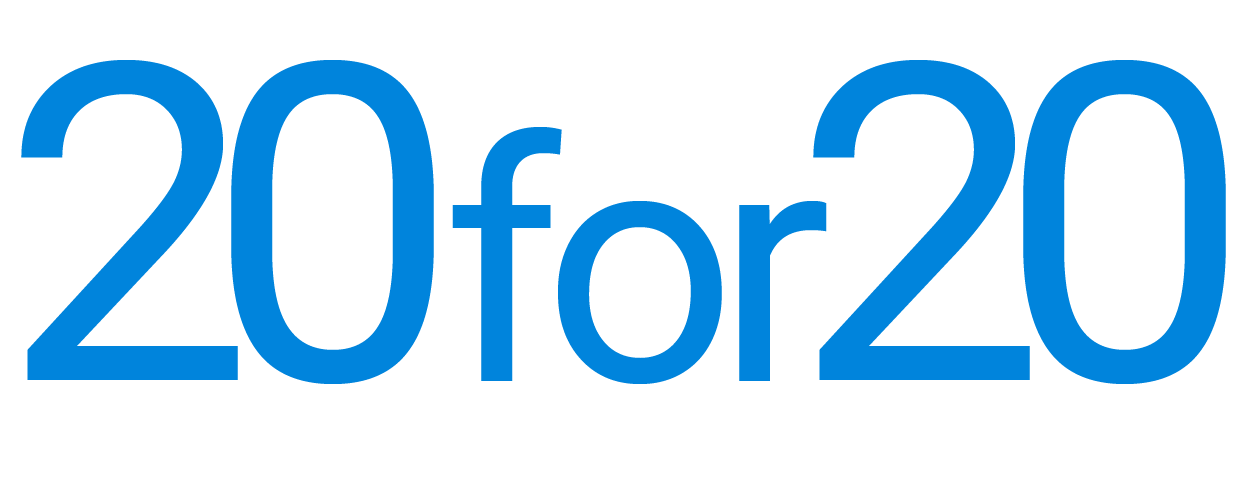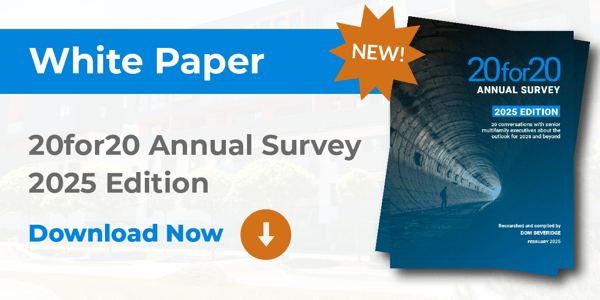
It's that time of year again when the 20for20 Annual Survey is officially launched. The conversations with 20 senior executives that took place at the end of 2024 have been reviewed extensively, synthesized, and turned into the seventh annual summary of all things top of mind in multifamily operations and technology. As usual, this year contains a mixture of new insights on new topics and progress on trends that had been central to previous editions.
There are a couple of overarching themes in this year's paper. First is the sense, from the conversation about industry performance, that there is light at the end of the tunnel. The outlook for 2025, in hindsight, looks like the second half of what leaders were expecting when they looked forward at 2024. The ethos of Survive to '25—widely expressed at the beginning of last year—now feels like an optimistic condensing of both 2024 and 2025 into a single year.
This group was generally more positive about the outlook for 2025. For the first time in three years, the annual temperature check showed more leaders expecting the year ahead to be better rather than worse. That reflects a cautious optimism. While there is still a lot of capacity to absorb in many markets, better times are in sight. It may take most of the year, but stabilization of supply will enable operators to refocus on performance, so the logic goes. Most seem bullish about '26 and '27.
But what about renewals?
A few highlights from this year's paper: It is surprising how many companies saw their renewal retention rates increase. 2024 was supposed to be a year when companies had to fight for every renewal due to unusual supply conditions. Instead, most companies improved their retention rates during what was expected to be a challenging year.
What is even more interesting is the number of different explanations people provided for why this happened. In preparing this year's paper, we enlisted ChatGPT's help to review all of the voiceovers from the conversations. It identified 18 different explanations that the paper lists. Renewals trends are truly multifactorial!
Of course, there is extensive discussion of centralization. Several years into this trend it is becoming clear that the composition of site teams is evolving. The REIT model of pooling resources and eliminating some roles entirely does not look applicable to the rest of the industry. This year's survey shows the growing range of adoption trends as centralization moves further into the mainstream.
AI adoption trend also receives coverage in the paper, with two distinct concurrent trends. One is the adoption and expansion of off-the-shelf, real estate-specific AI applications. The other is that some companies finally have an appetite to explore how large language models like Copilot, Gemini, and OpenAI can transform business operations beyond the email-writing use cases to which the technology has been limited thus far.
Application Adoption: A Mixed Bag
We report on the interesting trend in revenue management—how the most settled technology has become one of the most dynamic as companies actively change technology platforms and strategies. It appears that the period of wanting to steer clear of revenue management is now over for an increasing number of companies.
Finally, we make room for a broader discussion about the technology stack. A few different questions from this year's survey point to an unusually high level of focus on individual technology projects. There is a lot of tech, and the time leaders are spending on it is growing. But it is not always clear that the technology is actually helping, and customers are frequently left behind in the rush to adopt the latest shiny object.
These and many, many more insights receive extensive discussion in this year's survey, now in its seventh edition. Download your free copy now, and join the conversation. If previous years are any indication, today marks the start of a series of insightful conversations about multifamily operations and the technologies that support them.
Photo by Alejandro De Roa on Pexels



